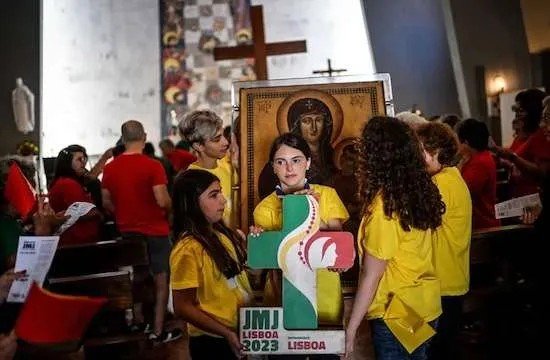World Youth Day and current issues in the Church
The international WYD gathering with the pope usually focus on festivity, fellowship and prayer; perhaps they should also encourage discussion on issues currently facing the Church
 One million young people are expected to attend the August 1-6 World Youth Day in Lisbon, Portugal. It could be an opportunity, beyond be a festive gathering of faith and fellowship, to engage the youth in discussions about the Church and its current problems (Photo, Bombarral Church, July 7, 2023). (Photo by PATRICIA DE MELO MOREIRA/AFP)
One million young people are expected to attend the August 1-6 World Youth Day in Lisbon, Portugal. It could be an opportunity, beyond be a festive gathering of faith and fellowship, to engage the youth in discussions about the Church and its current problems (Photo, Bombarral Church, July 7, 2023). (Photo by PATRICIA DE MELO MOREIRA/AFP)
In three weeks' time, World Youth Day (WYD) will take place in Lisbon. A million young people are expected to attend the August 1-6 gathering with Pope Francis in the Portuguese capital. It's only natural that such an event should be a great moment of pilgrim celebration, of sharing languages, cultures, experiences, joys, hopes and woes with others from all over the world.
It should be a place of festive communion, of collective fusion and even of individual love at first sight, as has happened before. There must also be times of silence and adoration. Hopefully, WYD will also be a place of spiritual experience and encounter with the "All Other", of discovery (and rediscovery) of Jesus Christ and the Gospel.
An anchor in today's society
I don't know whether the young pilgrims will join Francis in visiting the Marian Shrine at Fatima. If so, it would be a good idea to experience the gift of tears for suffering humanity. rather than wasting time on the politically manipulated and now irrelevant messages and "secrets" Our Lady allegedly shared with the young visionaries so many years ago.In retranslating what the Lisbon WYD experience could be, I give the impression that it will be all about feelings and the heart, which may well correspond to the expectations of our "very devout" young people, to quote a survey La Croix conducted on "the orientations of young (French) Catholics who go to World Youth Days".
But should we only strive to respond as well as possible to this dominant demand of those young people who have remained practicing Catholics? Wouldn't it be better, or more demanding, to give reason and the historical relevance of the Church their due? Couldn't the catecheses offered by the bishops in Lisbon be an opportunity to include this more reflective aspect (at least on days when they are not replaced by the inevitable "great witnesses"...)?
Explaining the Second Vatican Council
Perhaps the bishops should first persuade themselves of the importance of this exercise, and prepare for it seriously. Then, it would be important to resist the most obvious temptation at the moment: that of cheap piety and spirituality, of pious and edifying commentary on a biblical or gospel passage. Perhaps, the bishops could, instead, propose a teaching that gives food for thought on issues that are currently critical for the Church and of which many young Catholics (and not only them) are unaware.
In these times of "retraditionalization", liturgically and otherwise, it would be important, for example, to reiterate that there was a Second Vatican Council, and to explain the theological renewal it meant for the Church and its insertion "in the world of this time", without concealing the difficulties of its implementation and the contestations to which it was subjected.
It also seems to me that an honest reflection should be proposed – however painful the subject – on the sexual and spiritual abuses that are shaking the Church and creating an unprecedented crisis of confidence. This should include speaking about the "systemic" causes of abuse that are due, among other things, to an internal "clericalism" that has become unbearable.
Finally, what's most topical for the Catholic Church right now is the Synod on synodality, which will take place in Rome two months after World Youth Day. Surveys show that very few young people were involved in the local synodal consultations. Would talking to them – and getting them to discuss – what's at stake in this meeting for the Church, and therefore for them and their future in it, be out of place in the context of WYD?
The point is not to turn young people on their head or impose issues on them that they don't care about, but to remind them that the "joys and hopes" they experience in liturgical gatherings and festive encounters only make sense when they also accompany the "grief and anguish" of the Church and the world of today.
Jean-Louis Schlegel (b. 1946) is a French sociologist and theologian, author of several books, and respected commentator on matters of faith and religion.


 Votes : 0
Votes : 0









